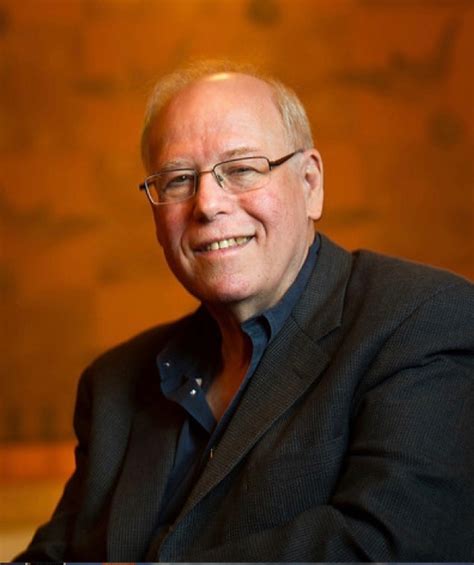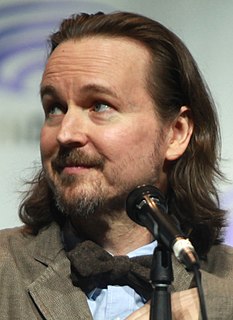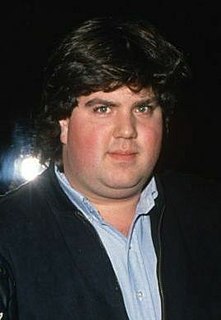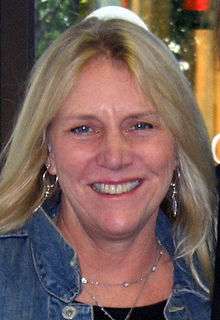A Quote by Brian Regan
I did some writing for that movie. The remake of Planet of the Apes. I didn't write the script. But I wrote some lines that they ended up... not using. ... I wrote one line. I thought it would've been perfect. I don't know if anyone saw the movie. It's the scene where the ape general comes in. And they're trying to decide if they should attack right there, or wait until a little later. And I wrote: "Man these bananas are good!" But they didn't use it. I did all of that research.
Related Quotes
When I wrote my first film and then directed it and I looked at it for the first time on what's called an assembly, you look at this movie which is every scene you wrote, every line of dialogue you wrote and you want to kill yourself the minute you see it. It's like, 'How did I write something so horrible?'
I've been writing music since I was about eight. I would write sporadically. I wrote a lot of music in high school. I guess the oldest song on the record ("I Thought I Saw Your Face") is about eight years old. It's the old "I had my whole life to write my first album and six months to write the second one." I did, to some degree, but actually, a lot of the songs that ended up on the record, I wrote really recently. So it varies.
The woman who wrote the movie [Ladies And Gentlemen, The Fabulous Stains], her name is Nancy Dowd. She's a wonderful writer. She wrote Coming Home. And when I read the script, at that time, I thought, "This movie is going to do for girls what Breaking Away did for boys." I thought it was going to be huge. It was a great script.
My mother had died when I wrote my first book. I was twenty-seven, so it was right at the beginning of my writing life. I don't know if she had lived, if I would have done it, certainly not quite like I did. But, you can't rethink it. You wrote what you wrote, it meant something to other people, and that's your good.
What I thought was so great about Rise [of the Planet of the Apes ] was that it wasn't a retelling; it was an entering of the universe at a different point. So it's Planet of the Apes. We already know the ending. There's no mystery in that! It becomes Planet of the Apes. So it's not about what is at the end; it's about how did we get there? And that enabled something that was totally fresh, which was an ape-point-of-view movie.
I wrote the plot [for the Persepolis ]and Vincent [Paronnaud] and I wrote and discussed the shooting of the script. Vincent then took care of the production design, the actual shooting, and what was going on within each scene. It's very difficult, though, to draw a line between who did what. Because Vincent would say something, and I would add something, and at the end you have this film, yet no clear idea of who did what.
I took to writing as my medicine to help me stay afloat in acting career journey. I wrote about me breaking hearts, and my heart being broken. I wrote about my views whether they were liberal or conservative. I wrote about everything. I wrote about my life. When I did not have paper coming in as green backs, I'd use random pieces of paper for stories. It was like, I got no money, but I have paper to write. So I wrote.
I made a movie when I was 15 years old with all my friends. This is when IMDb was a little more lax with its proceedings, so it's listed as one of my projects. I was 15 years old; it's a terrible movie. I wrote 50 percent of it because I wanted to kiss this one girl, and I wrote a kissing scene for it.
I always wrote. I wrote from when I was 12. That was therapeutic for me in those days. I wrote things to get them out of feeling them, and onto paper. So writing in a way saved me, kept me company. I did the traditional thing with falling in love with words, reading books and underlining lines I liked and words I didn't know.
People would say, "Well yeah, if I wrote action films, if I wrote the trash that you write, I could make millions too. But I want to write my real movie about these Guatemalan immigrants, and how they hid under a truck for 300 miles." And that's fine. I'd love to make that film too, but to dismiss everything I did just because it's action seems wrong.
I wrote a letter to my Dad - I wrote, "I really enjoy being here," but I accidentally wrote rarely instead of really. But I still wanted to use it, so I wrote, "I rarely drive steamboats, Dad - there's a lot of stuff you don't know about me. Quit trying to act like I'm a steamboat operator." This letter took a harsh turn right away.
There are people I'm drawn to that you just can't do a tiny, no-budget movie with. I would like to pursue some of that stuff, to see if I could do a movie with some of those people. And I don't really write scripts myself, but if I read a script I thought was really great, I would totally be up for doing a more traditional movie. It's just that I don't exist in that world.
right now.

































